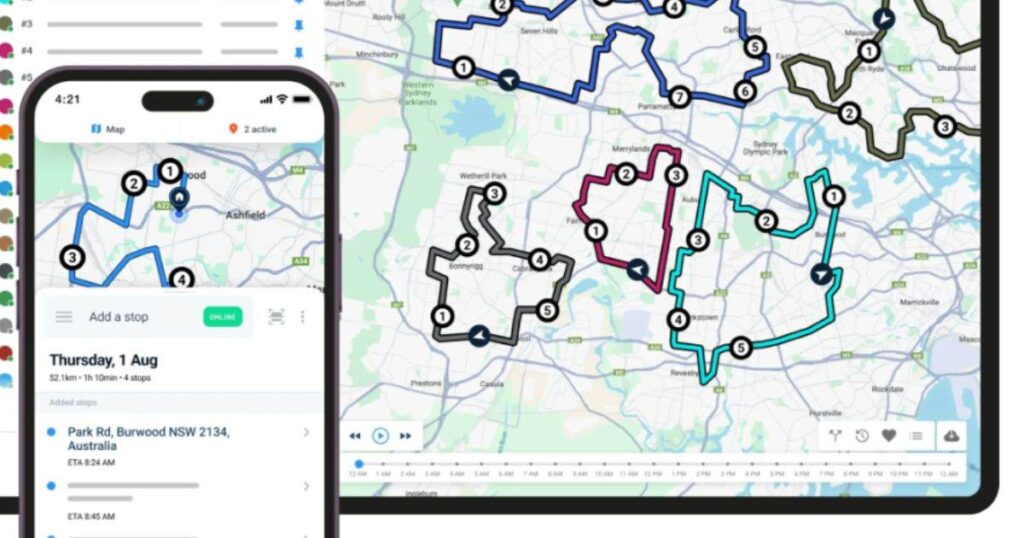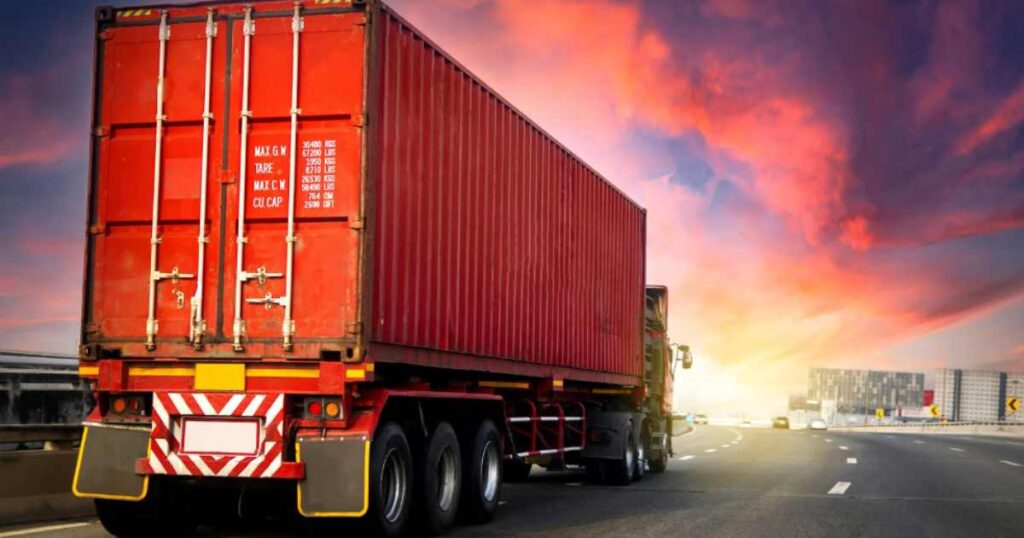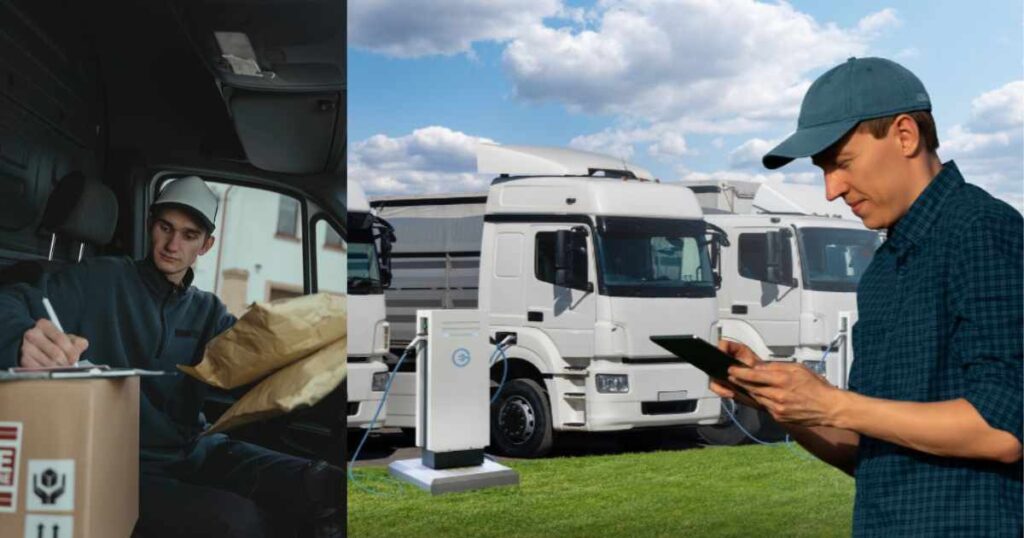It’s Friday afternoon, and your delivery trucks are scrambling to make the last drop-offs. One driver is stuck in traffic, another missed a turn, and a third is racing across town because the route wasn’t optimized. Where is a route planning app when you need one?
This chaos is not just stressful – it’s expensive.
But what if there was a way to cut through the mess, streamline your routes, and make every mile count? That’s exactly what a route planning app does.
The best free route planners are especially beneficial for small businesses, offering features like unlimited stops, cost savings, and user-friendly interfaces tailored to specific needs such as long-haul trucking or delivery management.
And if you’re not using one yet, you’re leaving money (and time) on the table.
Here are ten reasons why investing in a route planning app isn’t just smart – it’s essential.

1. A route planning app helps your business cut fuel costs
One of the primary benefits of using a route planning app is the ability to cut fuel costs. By optimizing routes, businesses can reduce the amount of fuel consumed by their vehicles, resulting in significant cost savings.
Additionally, this app can help businesses reduce their carbon footprint, making them more environmentally friendly.
Consider a scenario where your delivery trucks are driving extra miles due to inefficient routing. Each unnecessary mile not only adds to your fuel costs but also increases wear and tear on your vehicles.
A route planning app eliminates these inefficiencies by finding the shortest and fastest routes, ensuring that your vehicles use less fuel and operate more efficiently.
This translates to substantial savings on fuel expenses and maintenance costs over time.

2. Your logistics business gets happy customers
Customers expect fast, accurate deliveries.
A late order (or worse, a missed one) can turn a loyal customer into a competitor’s biggest fan. Route planning apps ensure deliveries are on time, every time.
Picture this: You are a restaurant owner running a local delivery service that relies on you for fresh produce daily.
If you’re late, your kitchen is in trouble. With this technology, your drivers consistently show up when expected, keeping customers happy and their businesses running smoothly.

3. Real-time adjustments (because things go wrong)
Even the best-planned routes can hit snags – road closures, accidents, sudden weather changes. A route planning app adjusts in real time, redirecting drivers on the fly to avoid delays.
Picture this: One of your drivers gets caught in unexpected roadworks. The app reroutes the driver instantly, bypassing the blockage and keeping the delivery on track.
No phone calls, no frantic map-checking – just seamless adjustments.

4. A delivery route planner helps you make more deliveries
In business, time is money, and a route planning app maximizes both.
By finding the most efficient routes, your drivers complete more deliveries in less time. That means increased capacity without adding more vehicles or staff.
Here’s a scenario: A furniture company making 30 deliveries a day increases to 40 without adding another truck, simply by optimizing routes.
That’s pure profit.
5. Your delivery business can cut down on overtime
Long shifts and overtime pile up costs and burn out your drivers. Route planning apps reduce drive times and streamline workloads, which means your drivers finish earlier and head home happier.
Picture this: Your drivers used to clock out at 8 PM. With optimized routes, they’re done by 6 PM. They’re thrilled, and you save on overtime. That’s a win for your business.

6. A route planning app = Better fleet management
Tracking your fleet in real time is a game-changer. Route planning apps often come with GPS tracking, giving you full visibility over your vehicles. This isn’t about micromanaging – it’s about staying informed and responding quickly.
Here’s a scenario: A driver is running behind schedule. You can see exactly where they are and provide updates to waiting customers.
Transparency builds trust.

7. Efficient routes reduce vehicle wear and tear
Extra miles equal extra wear and tear on your vehicles. A route planning app minimizes unnecessary mileage, which extends the life of your fleet and cuts down on maintenance costs.
Fewer detours mean fewer brake replacements, less tire wear, and reduced engine strain. It all adds up over time.
8. Route planning app: Make fewer delivery errors
Missed or incorrect deliveries can be a logistical nightmare. Route planning apps organize delivery sequences logically and ensure drivers have clear, efficient paths to follow.
Picture this: Your driver used to backtrack constantly, leading to mix-ups. The app now maps out deliveries in a logical order, cutting errors by half.

9. Scale your delivery business without the chaos
As your business grows, managing logistics becomes exponentially harder. A route planning app scales with you, handling increased deliveries and more drivers seamlessly.
Here’s a scenario: You start with five delivery trucks and grow to 20. The app scales effortlessly, preventing logistics headaches as you expand.

10. A Route planning app can get you ahead in the delivery industry
Efficiency isn’t just about saving money – it’s about outperforming competitors. Faster, more reliable deliveries give you an edge that customers notice. In a crowded market, that can make all the difference.
Let’s say this: Two furniture companies deliver similar products. One consistently delivers faster and on time, thanks to route optimization. Guess who gets the repeat business?
Final takeaways: A route planning app for your logistics needs
A route planning app isn’t just another tool – it’s a business asset that pays for itself over and over.
From fuel savings and happier customers to scale your operations without headaches, the benefits are hard to ignore.
If you’re serious about cutting costs, boosting efficiency, and staying ahead of the competition, now’s the time to invest. Your drivers (and your wallet) will thank you.
About the author
Sharl is a qualified journalist. He has over 10 years’ experience in the media industry, including positions as an editor of a magazine and Business Editor of a daily newspaper. Sharl also has experience in logistics specifically operations, where he worked with global food aid organisations distributing food into Africa. Sharl enjoys writing business stories and human interest pieces.










